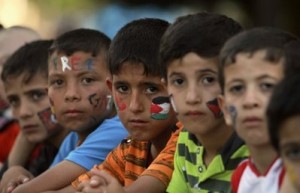
Whatever the detailed context and facts of the clash, it is the killing by Israeli forces of nine activists that dominates perceptions of the incident among Muslims, for whom the Palestinian cause is dear, analysts and Muslim commentators say.
Revulsion at the bloodshed on a Turkish vessel sailing to the Palestinian enclave could translate into increased fund-raising for transnational militant groups such as al Qaeda or like-minded allies, or foster tolerance or even sympathy for such groups among Muslims who are not otherwise ideological.
In some cases, it could push passive al Qaeda sympathizers into active participation against Israel or its Western allies, and undermine the international cooperation needed for tracking down illicit funding of militant groups, they said.
“For al Qaeda it doesn’t get any better than this. It’s really very dangerous,” said Noman Benotman, a British-based Libyan analyst and a former associate of Osama bin Laden.
He noted al Qaeda’s online propaganda experts were adept at recycling footage of Middle East violence to incite followers.
Peter Neumann, director of the Center for the Study of Radicalization at King’s College, London University, said the incident could prove to be a “tipping point” similar to the publication of U.S. abuse of Iraqi prisoners at Abu Ghraib prison, credited by analysts with deepening Arab and Muslim opposition to Western intervention in Iraq.
“I’d expect a significant impact from this on radicalization,” he told Reuters.
“Whatever the facts are, whoever is responsible for the violence, this will play on people’s perceptions. Psychologists call it a tipping point that can push someone from passive mode into active mode.”
Attacks on London’s transport system in 2005 by four young suicide bombers highlighted the danger of radicalisation among alienated young men from disadvantaged immigrant districts in Britain. Europe’s deadliest Islamist militant attack occurred in Madrid in 2004 when bombs on commuter trains killed 191.
While radicalisation of young Muslim citizens has been a concern in Europe for years, a Pakistani-American’s failed bid to set off a car bomb in New York’s Times Square on May 1 has raised fears that the United States is just as vulnerable to violence from immigrants as other Western countries.
In London, a British security source said the event would not necessarily produce any immediate result but it would play into al Qaeda’s wider narrative and might contribute over time to an ongoing radicalisation message.
U.S.-based terrorism consultant Evan Kohlmann said terrorism financing networks were best countered using accepted legal sanctions and transnational cooperation between regional allies.
Incidents such as the deadly Gaza flotilla raid risked weakening a “shared international resolve to punish those who manipulate humanitarian relief as a cover to fund terrorism.”
In Germany, Guido Steinberg, an expert on Islamist militancy, said the Turkish government’s tough criticism of Israel could influence Germany’s large Turkish community.
“Gaza is a mobilizing factor for jihadists, but it has been so for a while. What I’m worried about at the moment is the harsh reaction of Turkey. That might affect some people … Support for Gaza and Hamas mixes with Turkish national pride here,” he said.
In Britain, Muslim activists reported fury at the incident.
“My streets are in danger, and I say ‘streets’ meaning not just Bradford but the whole UK. This makes trouble for us peacemakers,” said Owais Rajput, a researcher at Bradford University in West Yorkshire, the home area of three of the four men who killed 52 people in the London attacks of 2005.
Abu Muaz of Call2Islam, a radical British-based Muslim group that seeks uncompromising opposition to Israel, said in the past two days there had been “a lot of anger among the youth.”
“They ask what’s the point of just demonstrating? In the mosques, the imams don’t have a solution.”

Leave a Reply
You must be logged in to post a comment.